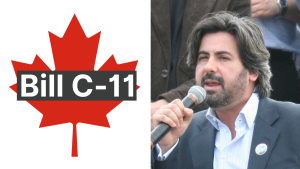
Image by Bill Smith via Flickr (CC BY 2.0)
Canada’s latest attempt to regulate speech comes in the form of the hotly debated bill, Bill C-11, the Online Streaming Act (though it was hardly debated in the House-–MPs rushed over 150 amendments to meet the government imposed deadline).
Bill C-11 would force online streaming platforms to follow CanCon (Canadian Content) rules and give unprecedented power to Canada’s media regulator, the CRTC (Canadian Radio-television and Telecommunications Commission), to boost audiovisual content they deem is “Canadian enough” and downrank or hide content that is not. This could impact online streaming platforms such as Netflix, YouTube, Spotify, and Instagram, i.e., any platform that hosts audiovisual content.
Granting algorithm manipulation powers to the CRTC
To control the content users see, the CRTC can directly force streaming platforms to manipulate algorithms. The Chair of the CRTC defended this move saying, “We won’t order these companies to change their algorithms specifically, but we will order them to have an outcome that could result in changing the algorithms (Emphasis added).”
In other words, if the “outcome” does not adhere to these new rules, companies will be forced to manipulate algorithms that will make the outcome work in a way that does comply with the new rules. So yes, the CRTC can and likely will order companies to change their algorithms should the bill pass. The consequence of this is an increasingly sanitized and state-regulated internet in which Canadian users will see more CRTC-approved content even if it’s not what they’re looking for. Online platforms would also be required to populate search results with a mandatory quota of certified CanCon content—and if streaming platforms don’t comply with these new rules, they would face significant financial penalties.
How is content determined to be ‘Canadian enough’?
Section 7 of the bill outlines what qualifies as ‘Canadian programming.’
Turns out, it’s not a simple process. To qualify as a certified Canadian content creator, creators must undergo a tedious application process through the CRTC called the ‘Canadian Program Certification.’ In it, creators must fill out a number of forms detailing information about the production, the genre and subject matter of the content, a budget outlining expenses, and they must satisfy one of the allowable program categories. This process follows an outdated points-based system in which a production must earn a minimum of 6 out of 10 ‘points’ to be deemed ‘Canadian enough.’
In addition, the CRTC would also be granted the power to determine which genre is worthy of more promotion at the expense of others (as stipulated in Section 9). This begs the question: What will this adjudication process look like? Will it be transparent? The bill states the CRTC will ensure “diversity of programming” — what diversity measures will it be following? How would it prioritize which type of diversity is more worthy of visibility: Ethnicity? Language of programming? Subject matter? Genre? And how would it ensure that biases are removed from this process? How would objectivity be guaranteed in a process that necessarily excludes certain content over others?
There’s also no timeline as to when or how long applications will take to process. This could disrupt the creator’s production and impact revenue.
Content producers must go through an arduous, time consuming application process just to get the stamp of approval by our media regulator to be considered ‘Canadian enough.’ And if they don’t, they run the risk of being shadowbanned across all streaming platforms, completely unbeknownst to them or the viewer.
No one is immune from CRTC bullying
All of these measures would increase the powers of the CRTC, an already powerful media regulatory body with a history of bullying news outlets into submission.
Two years ago, the CRTC received a complaint about a Radio Canada (the French arm of the CBC) host using the N-word in an online program. The host was speaking with a commentator about the book, Nègres blancs d’Amérique, in which they read aloud the book title. Ironically, the context of the discussion was about a petition demanding the dismissal of a university professor for quoting the same book title–the conversation centered around free speech and the question of using offensive or derogatory terms in certain contexts (Is it allowable in an educational setting?). The CRTC then took action and filed a complaint against Radio Canada, citing the content aired during the segment went “against the Canadian broadcasting policy objectives and values.”
The CRTC recently posted their final decision, outlining the actions that Radio Canada must do to repent for the host’s transgressions.
The punishment includes:
- A publicly written apology to the complainant.
- A report on ‘best practices’ that will be put in place to avoid future transgressions.
- A document that outlines ways the company intends to “mitigate the impact of the N-word in this segment of
the program” as it’s still available online.
Not even Radio Canada/CBC, Canada’s public broadcaster and close friend of the Liberal government is immune from CRTC overreach.
These measures reflect an undercurrent of protectionism where the government and the CRTC seek to protect legacy media at the expense of independent creators. And in an effort to maintain control (and get a cut of the profits), all of these companies work in lockstep to push legislation, like Bill C-11, to keep them at the top.
Broad, ambiguous legislation
Effectively, any audiovisual content in the world would be subject to potential regulation, granting unlimited powers to the CRTC. But the bill doesn’t actually specify the scope of these powers, their limitations, requirements, and so on. There’s no transparency and no requirement to notify the public of these limitations or guidelines the CRTC must follow. The rules that the CRTC must follow are unclear at best, and one can reasonably assume this is not a bug, but a feature of the bill.
In short, this bill would reward the Good, Patriotic Canadians who stay in line and follow the rules, not only of the CRTC, but the government (and well-behaved Canadian media companies never dare criticize the government). This bill will only breed further compliance, in which obedient Canadians will be rewarded, while other creators will be punished, their content shadowbanned, ultimately impacting viewership and revenue, and overall stunting diversity of content and range of thought, contributing to ever deeper echo chambers online.
Important to note is that Canadians did not ask for or express any desire for this bill. This move seems to be in line with a number of other measures the Canadian government has implemented to quash any sort of open discourse or dissent in Canada. A string of recent events— including the government freezing the bank accounts of lawful protesters, implementing the Emergency Measures Act to quash protests, and imprisoning dissidents — reflects the country’s steady descent into authoritarianism.
This bill is about control, not “showcasing Canadian content.” Canadians have a long history of suffering from Stockholm syndrome —we blindly trust the government even when our leaders openly deceive and betray us. This bill is no different. While some Canadians have openly criticized the bill, on the whole, of the few that know about it shrug and say ‘Maybe it’s for the best.’ Canadians are generally compliant, so the lukewarm response has been unsurprising, but still disappointing.
What’s the current status of the bill?
Currently the bill is in the pre-study stages in the Senate. Based on how things are looking, the Senate will be reviewing it for at least a couple months. There’s speculation that the Senate will go along with the House, but there is a possibility it will propose amendments.
At this point, I question anyone who confidently says Canada is a beacon of democracy and freedom. These past few years have never made it more clear that we are at risk of losing what it means to be a democratic country, and it’s being carried out under the guise of ‘diversity,’ ‘inclusion’ and ‘patriotism.’
We will follow-up with an update of Bill C-11 after the Senate decision.



